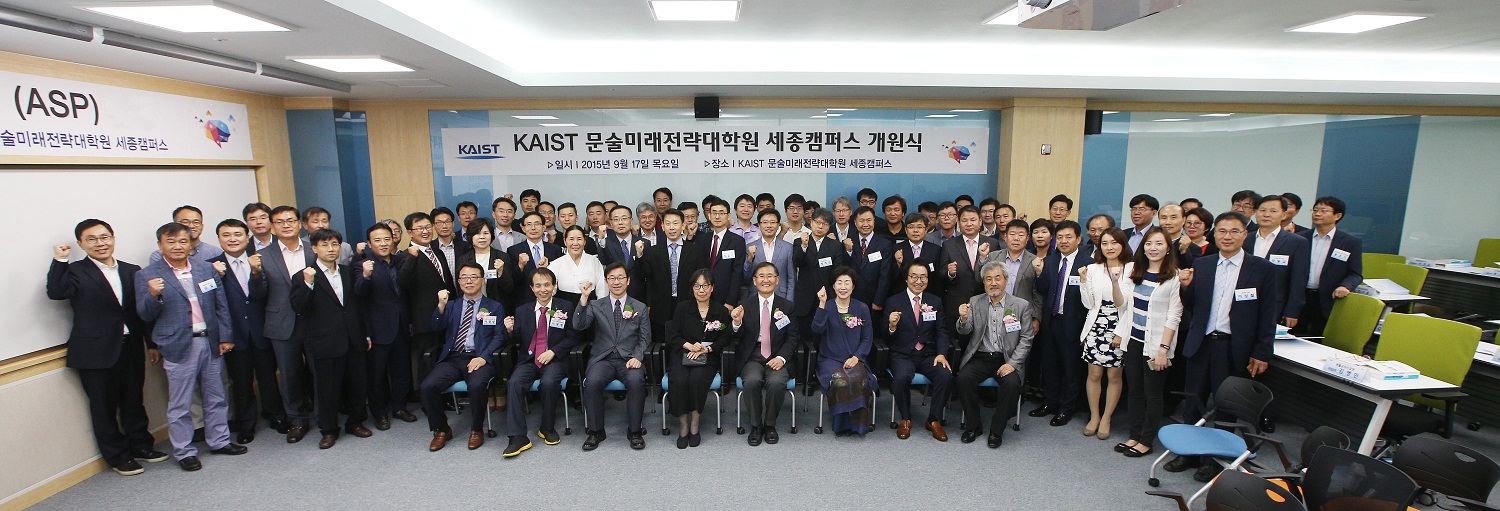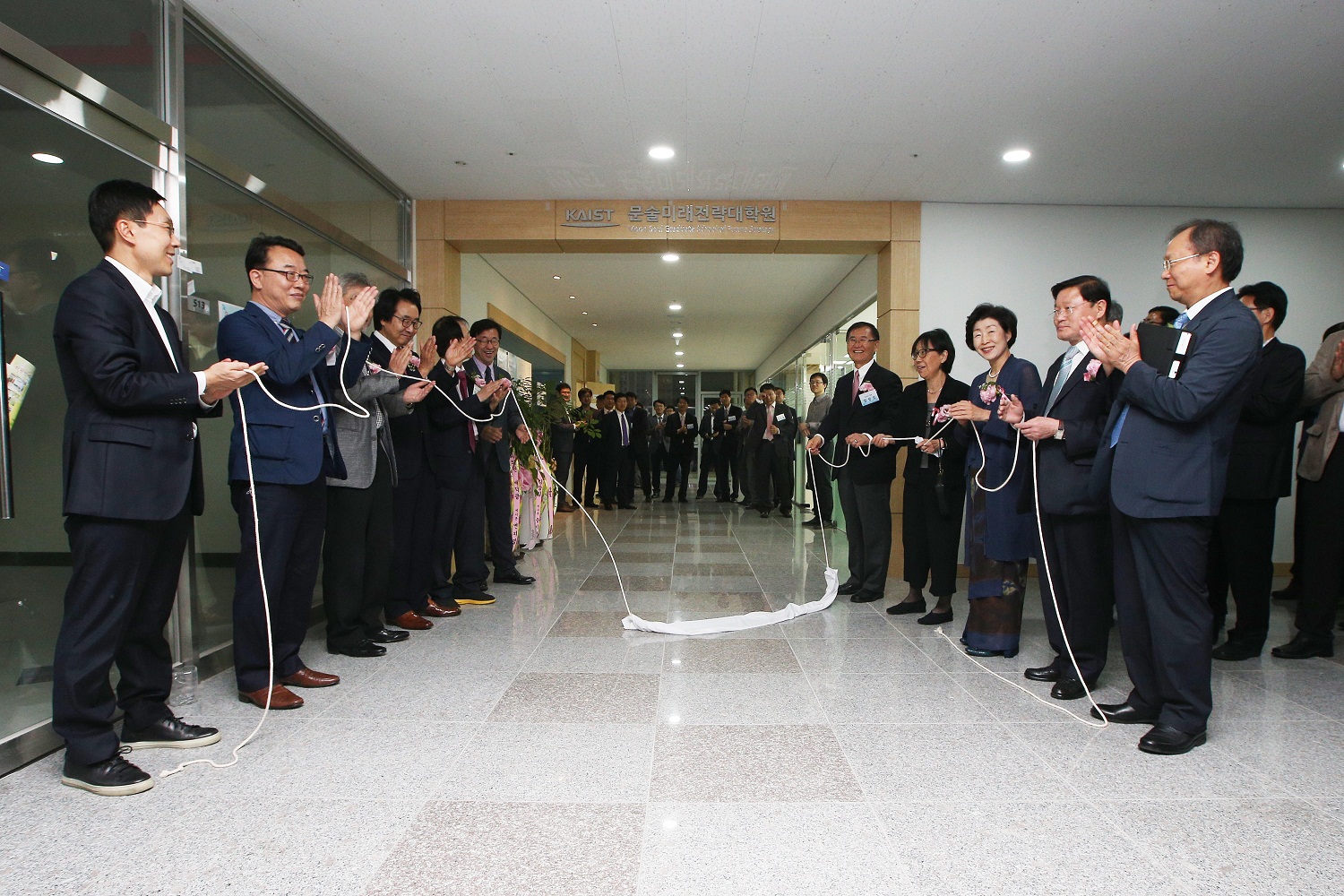event
Open forums for envisioning the next 30 years for Korea from the perspective of young people will be held in five metropolitan cities in Korea. Organized by KAIST and hosted by the Ministry of Science, ICT and Future Planning and the Committee for the 70th Anniversary of Korean Liberation, the Next Generation Open Forum 2045 invites young people to shape the future image of Korea for the upcoming 100th anniversary of Korean liberation. It will start off with its first event on September 22 in the Millennium Hall of Konkuk University in Seoul.
In this event, a panel and invited guests will discuss employment issues with a view to ameliorating problems prevalent in the society. A robotics scientist, Dr. JK Han will address the impact of robot automation on the job issue as a keynote speaker, and a performance featuring human-size robot actor will follow his talk to celebrate the opening of the event.
Invited guests can actively participate in the discussion by suggesting their opinions on job issue of the future and by voting on their smartphone apps during the event. Every opinion conveyed during the discussion will be printed and put in a time capsule, which will be opened in 2045 for the celebration of 100th anniversary of Korean liberation.
The Moon Soul Graduate School of Future Strategy of KAIST will organize events in five cities including Daegu, Daejeon, Busan, and Gwangju with topics including education, science and technology, unification diplomacy, and culture. The event will end with a symposium held in Seoul. Perspective applicants can apply for free to the Next Generation Open Forum 2045 on the official website of the Committee for the 70th Anniversary of Korean Liberation.


-
research KAIST Develops a Multifunctional Structural Battery Capable of Energy Storage and Load Support
Structural batteries are used in industries such as eco-friendly, energy-based automobiles, mobility, and aerospace, and they must simultaneously meet the requirements of high energy density for energy storage and high load-bearing capacity. Conventional structural battery technology has struggled to enhance both functions concurrently. However, KAIST researchers have succeeded in developing foundational technology to address this issue. < Photo 1. (From left) Professor Seong Su Kim, PhD
2024-11-27 -
event KAIST Office of Global Initiative Hosts 2024 Global Startup Internship Seminar
< Photo of ImpriMed CEO Sungwon Lim’s lecture > The Office of Global Initiative at KAIST successfully hosted the 2024 Global Startup Internship Seminar (GSIS) from Wednesday, November 20, to Friday, November 22. Now in its third year, following the 2022 Global Startup Internship Fair, the GSIS aims to introduce KAIST students to internship opportunities at U.S.-based startups and encourage participation in global internship programs, particularly for students with entrepreneu
2024-11-25 -
research KAIST Secures Core Technology for Ultra-High-Resolution Image Sensors
A joint research team from Korea and the United States has developed next-generation, high-resolution image sensor technology with higher power efficiency and a smaller size compared to existing sensors. Notably, they have secured foundational technology for ultra-high-resolution shortwave infrared (SWIR) image sensors, an area currently dominated by Sony, paving the way for future market entry. KAIST (represented by President Kwang Hyung Lee) announced on the 20th of November that a research t
2024-11-22 -
event KAIST’s RAIBO2 becomes the World’s First Robo-dog to Successfully Complete a Full-course Marathon
KAIST's quadrupedal walking robot "RAIBO", which can run seamlessly on sandy beaches, has now evolved into "RAIBO2"and achieved the groundbreaking milestone by becomeing the world's first quadrupedal robot to successfully complete a full-course marathon in an official event. < Photo 1. A group photo of RAIBO2 and the team after completing the full-course marathon > KAIST (President Kwang Hyung Lee) announced on the 17th of November that Professor Je Min Hwangbo's research team of t
2024-11-17 -
research KAIST Unveils New Possibilities for Treating Intractable Brain Tumors
< Photo 1. (From left) Professor Heung Kyu Lee, KAIST Department of Biological Sciences, and Dr. Keun Bon Ku > Immunotherapy, which enhances the immune system's T cell response to eliminate cancer cells, has emerged as a key approach in cancer treatment. However, in the case of glioblastoma, an aggressive and treatment-resistant brain tumor, numerous clinical trials have failed to confirm their efficacy. Korean researchers have recently analyzed the mechanisms that cause T cell exhaus
2024-11-15